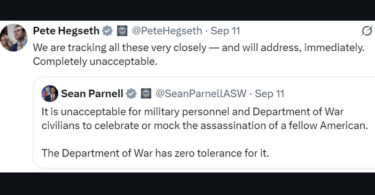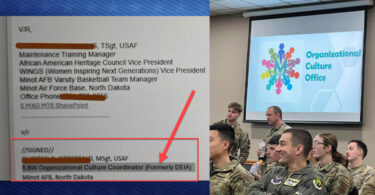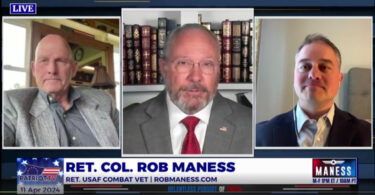By Larry Sand, American Greatness
While it certainly hasn’t been done away with, the anti-quality, anti-fairness, and anti-American “Diversity, Equity, and Inclusion” hustle is taking some hits.
This ugly form of tribalism pits men, whites, and the rich (oppressors) against women, blacks, and the poor (the oppressed.)
With a language all their own, DEI-ists have wormed into just about every facet of American life. The government, its schools, the military, and corporations have all embraced the sect.
Of late, Jews have been targeted. After the savage attack on innocent Israelis by Hamas butchers on October 7, Jews have been branded as oppressors, and Israel was deemed a “genocidal, settler, colonialist state” in the minds of the DEI tribe.
One former DEI official explained that “criticizing Israel and the Jewish people is not only acceptable but praiseworthy” and “if you defend them, you’re actively abetting racist oppression.”
Bari Weiss sums DEI up perfectly, explaining that it is an “ideological movement bent on recategorizing every American not as an individual, but as an avatar of an identity group, his or her behavior prejudged accordingly, setting all of us up in a kind of zero-sum game.”
Ultimately, standards are lowered, personal responsibility is eliminated, quality suffers, and acrimony toward various ethnic groups is sanctioned.
 The country’s students have been heavily indoctrinated in DEI and are directly acting on their brainwashing.
The country’s students have been heavily indoctrinated in DEI and are directly acting on their brainwashing.
For example, earlier this month, students at the exclusive Illinois Mathematics and Science Academy (IMSA) protested school policies relating to DEI, notably listing specific punishments they wanted to be added for “bias incident reports,” including alerting future colleges.
Parents Defending Education released a video in mid-December, which showed a group of robot-like students at an IMSA protest rally chanting their frustrations.
Students complained loudly about their preferred names and their pronouns not being used at school, and that “uneducated people” were allowed to work there.
The list of student demands includes a “public outline of the possible consequences for students following a bias incident report” and “those consequences must have concrete impacts for the offender,” which include “detentions, removal from leadership positions, suspensions, expulsions, and notification to parents and potential future colleges.”
Clearly, educational quality has been negatively affected as a result of DEI measures. Many states have abandoned high school exit exams as a graduation requirement for their students, as standardized tests are becoming passé.
Sadly, policymakers in New York, New Jersey, and Florida—three of the nine states that still require students to pass certain exams to graduate—have introduced measures to make the tests optional or do away with them completely. And Massachusetts is moving in the same direction.
In Chicago, Mayor Brandon Johnson has decided to eliminate the city’s 11 selective public high schools, which use standardized tests to determine student admissions.
But now, there is pushback starting to kick up over DEI, in part due to a Supreme Court decision in June. The SCOTUS found that the president and fellows of Harvard University had effectively engaged in racial discrimination in the name of diversity, a decision that functionally invalidated racially conscious college admissions.
However, National Review’s Noah Rothman notes that even before the Supreme Court’s ruling,
“colleges across the country had begun to pare back the bloat associated with the expansion of DEI-related managerial tasks and the non-faculty administrators who oversaw them. Republican lawmakers in states such as Florida, Texas, North and South Carolina, and Ohio secured legal prescriptions against discriminatory practices in hiring and blocked in-state schools from imposing DEI-related ideological litmus tests on students.”
Texas Rep. Dan Crenshaw is pushing to halt federal funding to colleges and universities that force students to sign or make DEI-related statements. His bill would ban places of higher education from compelling students, staff, or applicants to “endorse an ideology that promotes the differential treatment of an individual or group of individuals based on race, color, or ethnicity.”
In Oklahoma, Gov. Kevin Stitt has just signed an executive order that would eliminate offices of diversity, equity, and inclusion. “I’m signing the executive order today to remind all state-funded institutions that we see all Oklahomans as equal, regardless of race, color, sex, ethnicity, or national origin,” Stitt said. The order requires a review and eventual elimination of spending on all DEI programs.
Utah Gov. Spencer Cox has attacked DEI programs at the state’s colleges and universities, repeating his assertion that such initiatives foster divisiveness instead of inclusivity during a recent news conference. Cox also vowed to end a requirement that higher education employees sign a “diversity statement” as a term of employment.
“These diversity statements you have to sign to get hired, I think that is awful, bordering on evil,” Cox said during the televised news conference. “We’re forcing people into a political framework before they can even apply for a job with the state.”
On the downside, as of July of this year, while legislatures in 22 states had proposed 40 bills to regulate DEI in schools, only seven have become law, according to The Chronicle of Higher Education.
While much of the resistance to DEI has been coming from the college realm, the private sector is also awakening to the pernicious effects of the scam. Wealthy businessmen like Peter Thiel and Elon Musk have been very outspoken against DEI, sharing their thoughts in the media.
In fact, DEI is in retreat as corporations are getting nervous about reverse discrimination lawsuits. The American Alliance for Equal Rights has taken legal action or threatened top law firms and other organizations, alleging they have excluded white and Asian students from fellowship programs based on race.
According to Reuters, at least six major U.S. companies, including JPMorgan Chase, have modified policies meant to boost racial and ethnic representation that conservative groups threatened to sue over. Many companies have removed “diversity” from job titles.
In all, 25 companies have received public shareholder letters since 2021 claiming their DEI programs “constitute illegal discrimination and a breach of the directors’ duties to investors.”
As a recent report from consulting firm Paradigm notes, “2023 has undeniably shifted the DEI landscape for years to come.” Paradigm adds, “External forces are no longer pushing companies to invest in DEI; instead, in some cases, external forces are pushing back on companies’ investment in DEI.”
Other than the blatant unfairness and civil and moral rot of DEI, there are very practical reasons for individuals to reject it. I will exit with my perennial question for the DEI-ists:
The next time you are trying to find a surgeon, will you pick the one who was licensed because she was the right minority or the one who earned her position the old-fashioned way?
Now substitute auto mechanic and electrician for surgeon. How do you respond?
And do you want your favorite basketball team to be comprised of players of various ethnicities and genders, or the team that had the best damned players money could buy?
I can’t wait for your response.
* * *
Larry Sand, a retired 28-year classroom teacher, is the president of the non-profit California Teachers Empowerment Network – a non-partisan, non-political group dedicated to providing teachers and the general public with reliable and balanced information about professional affiliations and positions on educational issues. The views presented here are strictly his own.








I don’t believe in the DEI principal of “equity” because I believe one definition for this term is “everyone should achieve the same result”. However, most corporations are touting “equity” as “fair treatment to all people”.
What is a way to fight the use of the term “equity”?